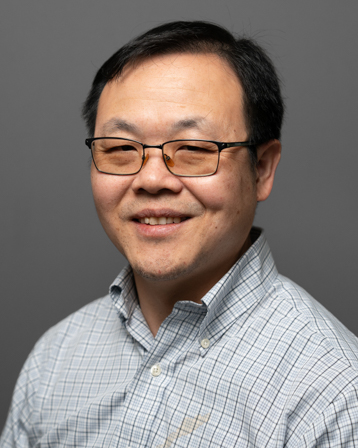Pingbo Tang
Associate Professor, Civil and Environmental Engineering
Associate Professor, Civil and Environmental Engineering

Pingbo Tang is an associate professor in the Department of Civil and Environmental Engineering. He founded and is directing Spatiotemporal Workflows and Resilient Management Laboratory (SWARM Lab). He obtained his bachelor’s degree of civil engineering in 2002, and his master’s degree of bridge engineering in 2005, both from Tongji University, Shanghai, China. He obtained his Ph.D. from the group of Advanced Infrastructure Systems (AIS) at Carnegie Mellon University in 2009.
Tang’s research explores the remote sensing, human systems engineering, data analytics, and information modeling technology to support spatiotemporal analyses needed for predictive management of constructed facilities, workspaces and civil infrastructure systems. His on-going studies have been examining sensing and modeling methods for comprehending the Human-Cyber-Physical-Systems (H-CPS) in accelerated construction and infrastructure operations (e.g., airport operations, nuclear plant outage control). He has published more than 100 peer-reviewed articles in these areas. The National Science Foundation (NSF), Department of Energy (DOE), The National Aeronautics and Space Administration (NASA), Salt River Project (SRP), and Phoenix Government have funded his research efforts.
Tang holds memberships or leadership positions of the American Society of Civil Engineers (ASCE, the Chair of the ASCE Data Sensing and Analysis committee), TRB (Committee on Bridge Management, AHD35), IABSE, ASPRS, and ASTM International (Committee E57: 3D imaging systems). He is on the editorial board of ASCE Journal of Computing in Civil Engineering, as well as a reviewer of multiple top journals and conferences related to Computing in Civil Engineering. He won best paper awards on top conferences (the 2019 ASCE International Conference on Computing in Civil Engineering, the ASCE 2017 International Workshop on Computing in Civil Engineering, the ASCE 2009 Construction Research Congress), the best poster award of Construction Industry Institute's 2011 Annual Conference, the 2013 Recent Alumnus Achievement Award of the Civil and Environmental Engineering Department at Carnegie Mellon University. Tang won the National Science Foundation CAREER Award in 2015.
2009 Ph.D., Carnegie Mellon University
2005 M.S., Tongji University, China
2002 B.S., Tongji University, China
CMU Engineering
Civil and environmental engineering faculty have developed a testbed to make AI-enabled digital twins more accessible in the curriculum, but it is also proving valuable in active infrastructure research.
Carnegie Bosch Institute
As a new CBI fellow, Jinfeng Lou, hopes to on creating robust, adaptable models that incorporate real-time data from sensors, environmental indicators, and human behavior during emergencies such as subway flooding.
Carnegie Bosch Institute
Faculty members Pingbo Tang and Cleotilde Gonzalez are working together with CBI Fellow Jinfeng Lou to help solve subway flooding in urban areas using AI and human solutions.
Fast Company
CEE's Pingbo Tang was quoted in Fast Company about how AI can improve flight schedules.
Carnegie Mellon University
Transportation safety experts from CMU’s Safety21 partnered with the DOT’s University Transportation Centers to lead the inaugural Future of Transportation Summit in Washington D.C. from August 13th-15th. CMU faculty showcased their research and innovations with the goal of improving transportation safety.
Civil and Environmental Engineering
CEE hosts its inaugural Spring Industry Day with speakers and panels discussing how cutting-edge technologies are reshaping the future of our field.
CMU Engineering
A recent study leverages information provided by building occupants when answering multiple related questions about their thermal comfort to find the real “comfort zone” for most people in a building.
CMU Engineering
Pingbo Tang is working toward realizing several AI techniques supporting the predictive management of aircraft and other systems.
Civil and Environmental Engineering
Years after studying together at CEE, Professor Pingbo Tang and Ethos Collaborative Principal Damon Weiss are working side by side again—looking for ways to recognize potential issues in operating and maintaining our country’s aging water treatment facilities.
Civil and Environmental Engineering
Jinding Xing, a Ph.D. candidate in CEE, has been awarded the prestigious Robert E. Uhrig Graduate Scholarship by the Human Factors, Instrumentation, and Controls Division (HFICD) of the American Nuclear Society (ANS).
Civil and Environmental Engineering
Tang plans to develop dynamic decision-making games for operating and maintaining various civil infrastructure systems based on the research data, digital models, and relevant materials accumulated by him over the past decade.
Civil and Environmental Engineering
Part Two: A Space Ripe for Innovation & Industry Collaboration